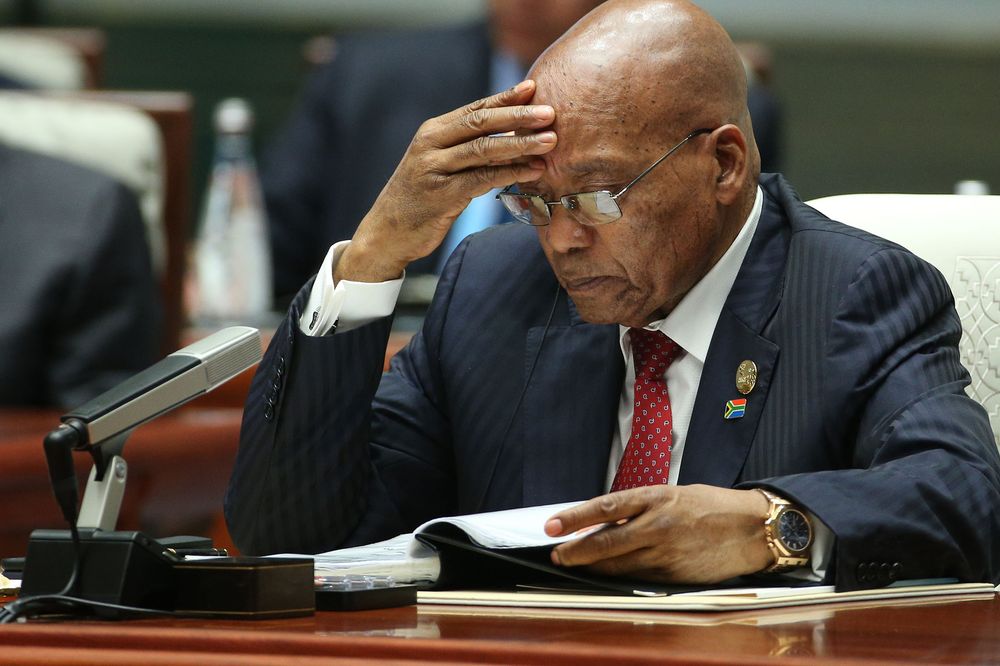South Africa’s Supreme Court of Appeal opened the way for the reinstatement of criminal charges against President Jacob Zuma by upholding a lower court’s ruling that a decision by prosecutors to scrap them was “irrational.”
Zuma’s lawyers conceded in a Sept. 14 hearing at the High Court that the National Prosecuting Authority’s reasoning in dropping the case eight years ago was wrong but argued that the president should be allowed to make representations before a new decision is taken on whether to charge him. The court was silent on the issue and stopped short of ordering prosecutors to proceed with the case. Zuma’s office called the ruling Friday “disappointing.”
“On principle, the decision to charge stands and that means the prosecuting authority must now officially go to court and reinstate the charges,” Pierre de Vos, a law professor at the University of Cape Town, said by phone. “Whether they will do so is another story. They will try other mechanisms to stall the process. It will drag on for as long as President Zuma has the funds to pay his lawyers.”
The NPA spent eight years investigating allegations that Zuma, 75, took 4.07 million rand ($304,000) in bribes from arms dealers and charged him with corruption, racketeering, fraud and money laundering. It abandoned the case in 2009, months before he became president, saying taped phone calls indicated that chief investigator Leonard McCarthy used the case against Zuma to frustrate his efforts to win control of the ruling African National Congress from then-President Thabo Mbeki.
Political Machinations
The court said the allegations that the political machinations had tainted the investigation were irrelevant because they were unconnected to the integrity of the case against Zuma and the prosecution itself. It found that discontinuing it didn’t advance the course of justice or promote the integrity of the NPA.
The earlier ruling by the High Court’s that the decision “to terminate the prosecution was irrational cannot be faulted,” Judge Eric Leach said in his ruling delivered in the central city of Bloemfontein. “It is difficult to understand why the present regime at the NPA considered that the decision to terminate prosecution could be defended.”
The Democratic Alliance, the main opposition party, said it will write to NPA head Shaun Abrahams and ask him to serve Zuma with an indictment and ensure he appeared in court at the soonest possible date.
Difficult Position
“The Supreme Court of Appeal is saying that the NPA has delayed this matter obstructively and if it then starts delaying it any further, we will go back to court and ask the court to compel Advocate Abrahams to take the necessary action,” DA Federal Executive Chairman James Selfe told reporters in Pretoria. “I think Abrahams will be in a very difficult position if he does not proceed.”
The NPA isn’t obliged to take immediate action, its spokesman, Luvuyo Mfaku, said.
The Supreme Court of Appeal “never articulated itself on the way forward, so it goes back to the NPA,” Mfaku said by phone. “It is the NPA that has to consider the matter again. The national director of public prosecutions along with his team will study the judgment and after considering it comment extensively in terms of how it is going to be taken forward.”
Zuma expects that the prosecutor will now consider his arguments, the Presidency said in a statement. “Any person has the right to make such representations and an expectation that a legitimate decision will be made,” it said.
The judgment comes just two months before the ruling party elects a new leader to replace Zuma, who has defeated several attempts to remove him from office amid a succession of scandals. A trial may also coincide with campaigning ahead of a national election in 2019 and follows a Constitutional Court ruling last year that the president violated his oath of office by refusing to repay taxpayer funds spent on his private home.
Leadership Battle
Reinstating the charges could damage the campaign of Nkosazana Dlamini-Zuma, the president’s preferred successor for the leadership of the ANC in December, and possibly lead to him leaving the national presidency before his term ends in 2019, according to Susan Booysen, a political science professor at the University of the Witwatersrand’s School of Governance.
“He has got his proxy or proxies in the race and of course it would reflect on them, because it would put more pressure on them to continue to take clear stands against corruption at a presidential level,” she said by phone on Thursday.
Dlamini-Zuma, the former chairwoman of the African Union Commission and Zuma’s ex-wife, and Deputy President Cyril Ramaphosa are currently seen as the front-runners for the ANC’s top position.
The ANC said in a statement that it had noted the court decision and would comment once it had studied the judgment.


